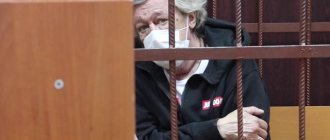TASS DOSSIER. On March 26, 2022, former Minister of the Open Government of the Russian Federation Mikhail Abyzov was detained in a criminal case of theft of 4 billion rubles. The Investigative Committee of the Russian Federation charged him with committing crimes under Part 3 of Art. 210 and part 4 of Art. 159 of the Criminal Code of the Russian Federation (“Creation of a criminal community using official position” and “Fraud on an especially large scale”). The editors of TASS-DOSSIER have prepared material about Article 210 of the Criminal Code of the Russian Federation and high-profile cases of its enforcement.
Article 210
Article 210 “Organization of a criminal community (criminal organization) or participation in it (it)” has been included in the Criminal Code of the Russian Federation since its adoption in 1996. The peculiarity of this article is that criminal liability is established for the very fact of organizing a criminal community or participating in it, regardless of whether any crimes were committed.
Participation and organization (leadership) of a criminal community are classified as grave and especially grave crimes and can be punishable by up to life imprisonment.
According to the current version of Article 210 of the Criminal Code of the Russian Federation, the organizers and leaders of a criminal community face imprisonment for a term of 12 to 20 years, and members of such a criminal group - from five to ten years. At the same time, persons who have committed a crime using their official position can be sentenced to imprisonment for a term of 15 to 20 years, and those who occupy “the highest position in the criminal hierarchy” (Part 4 of Article 210) - up to life imprisonment. Article 210 also provides for punishment in the form of a fine of up to 1 million rubles for the leaders of a criminal group and up to 500 thousand rubles for its participants.
According to data from the Judicial Department of the Supreme Court of the Russian Federation, in 2017, 156 people were convicted under Article 210 of the Criminal Code, and 59 in the first half of 2022 (later data have not been published).
Organized crime raiders, pimps and deputies
In the summer of 2016, former City Duma candidate and lawyer Alexei Klimov was arrested in Voronezh. According to investigators, the lawyer, together with two former police officers Viktor Vostrikov and Roman Kornev, as well as another local resident Alexander Boldyrev, organized a brothel “for direct financial gain.” The girls who “worked” for the group were kept in the brothel, including by force and blackmail. The ex-policemen and Boldyrev were charged with organizing prostitution (Part 2 of Article 241) and participating in an organized criminal group (Part 2 of Article 210), and lawyer Klimov was charged with maintaining a brothel (the same Part 2 of Article 241) and creating a criminal group ( part 1 of article 210).
Deputy of the People's Assembly of Dagestan Eduard Khidirov became involved in the case of creating a criminal community in November 2015; in August 2016, the materials were transferred to the court. In addition to the charge under Part 1 of Article 210, Khidirov, as well as his six accomplices, are charged with creating 14 front companies, illegal cash withdrawals, providing false documents and raider takeovers. According to investigators, in only two episodes (raider takeover of a bank and theft of funds from an insurance company), Deputy Khidirov and his people embezzled more than 500 million rubles.
In Tatarstan, a group of seven people, which included the head of the duty shift of the Komsomolsky Department of Internal Affairs of the city of Naberezhnye Chelny, Andrei Shchipitsyn, and four employees of the cadastral service, for nine years forcibly evicted local residents who had problems with alcohol from their apartments. The victims had accumulated large debts for housing and communal services, so they did not resist much, believing that by evicting them, the police and officials were acting on behalf of the state. People were taken out of the city, to old houses, which, as new guests “moved” there, turned into hostels, and any attempts to return to the city and contact relatives were suppressed. The vacated apartments were sold, so the group “earned” more than 20 million rubles. When a criminal case was opened in 2013, there were 30 victims.
Policeman Shchipitsyn and the employees of Rosreestr were charged under Part 3 of Article 210, since they used their official position, and the rest of the criminal community were charged under Parts 1 and 2 of the same article; in addition, they were all accused of fraud (Article 159 of the Criminal Code). In March 2016, the organizer of the group received 9.5 years, and his “right hand” received 8.5 years in prison. The policeman was sentenced to six years in a general regime colony; two of the four employees of Rosreestr were also sent to a colony.
Judicial practice shows that cases of illegal gambling, drug trafficking, and raider takeovers are often brought under Article 210. “The condition for bringing charges under Article 210 is several episodes of grave and especially grave crimes committed by an organized group that has a structure, distribution of roles, and jointly planning a crime. Three or more episodes in a group almost guarantees charges under Article 210,” says lawyer Zherebenkov.
Tougher punishment
In 2022, Russian President Vladimir Putin submitted to the State Duma draft amendments to the Criminal and Criminal Procedure Codes, which tighten responsibility for the creation and management of an organized criminal community. On March 14, the amendments were adopted by the State Duma of the Russian Federation, and on March 27, they were approved by the Federation Council. The law will come into force after it is signed by the president.
The Criminal Code is supplemented by a new article 210.1 (“Occupying a higher position in the criminal hierarchy”), which establishes a punishment for this crime in the form of imprisonment for a term of eight to 15 years with a possible fine of up to 5 million rubles. When imposing cumulative penalties, the maximum term of imprisonment cannot be more than 30 years, and for cumulative sentences - more than 35 years. In addition, the law provides that persons occupying a higher position in the criminal hierarchy cannot be given a sentence below the lowest limit or a suspended sentence.
A separate element of the crime is the rule relating to meetings of leaders and members of organized crime groups (so-called gatherings) for the purpose of committing at least one of the crimes provided for in Article 210 of the Criminal Code of the Russian Federation. The punishment for this is established in the form of imprisonment for a term of 12 to 20 years with a possible fine of up to 1 million rubles. In addition, fines for organizing and leading an organized criminal group, as well as for using an official position, are increasing - up to 5 million rubles. Participation in a criminal community will be punishable by imprisonment for a term of seven to 10 years with a fine of up to 3 million rubles.
Organized criminal civil servants
“If the accused are officials or businessmen, people working in certain structures, the investigator, for several episodes, of course, charges them with Article 210 for various types of cases of financial fraud. There is a box office, roles, and a hierarchy - you don’t need to invent anything,” says Vladimir Zherebenkov.
The accused in the case of such a “structure” was one of his clients, former investigator of the Main Investigation Department of the Investigation Department of the Ministry of Internal Affairs, Sergei Kavun. According to investigators, investigator Kavun and his colleagues Evgeny Primakov and Angela Amzina illegally appropriated 44 departmental apartments and then began selling them at market prices. Amzina is considered the organizer of the criminal community; she and Primakova, in addition to fraud, are charged with receiving a bribe, and Kavun is charged with possession of a cartridge from a 9 mm pistol and a bag of marijuana, which the district police officer allegedly found on the street where the windows of the investigator’s apartment overlook.
In November 2010, the Novosibirsk Regional Court sentenced Alexander Solodkin Sr., the former president of the Novosibirsk Olympic Council, and his son Alexander Solodkin Jr., the former vice-mayor of Novosibirsk, to six and 8.5 years in prison, respectively. Father and son spent five years in a pre-trial detention center on charges of fraud, attempted murder and participation in a criminal community - the so-called Trunovsky group (after the name of one of the defendants in the case, businessman Alexander Trunov). Solodkin Sr. was released in June 2016; his son is still serving time in a general regime colony.
Article 210 also appears in the scandalous case of the youngest general of the Ministry of Internal Affairs, Denis Sugrobov: the investigation believes that the former head of the Main Directorate for Economic Security and Anti-Corruption (GUEBiPK) and his deputy Boris Kolesnikov (in the summer of 2014, he, being accused, fell from the window of the Investigative Office building committee) allegedly organized a criminal community within the Ministry of Internal Affairs, consisting of their subordinates who were engaged in provoking bribes. The defense of Sugrobov and other accused insists that the police were charged with Article 210 in order to compensate with the severity of the charges for the weakness of the evidence base.
According to investigators, the leadership of the Komi Republic has also been a structured criminal community for many years: the key defendants in the so-called Gaiser case, the materials of which speak of 2.5 billion rubles stolen from the budget, have been charged under Article 210. In total, 19 people appear in the case people, including top managers of Renova and former governors - Vyacheslav Gaizer, who was arrested last fall and Vladimir Torlopov, who was sent under house arrest this fall. “This is an extraordinary event. This is a recognition that a criminal group led one of the key regions for a long time,” Ilya Shumanov, Deputy General Director of Transparency International Russia, described what was happening.
General elements of the crime
In addition to the above acts, Art. 210 part 1 of the Criminal Code of the Russian Federation formulates punishment for the leadership of criminal associations or structural units included in them. Coordination of illegal actions and the formation of stable connections between different independently functioning organized groups are qualified as an illegal act. The crime under Art. 210 of the Criminal Code of the Russian Federation includes the creation of conditions and the development of plans for the commission of unlawful acts by such associations. Responsibility under the article in question occurs in the event of a division of spheres of influence and illegal income between groups, committed by the subject with the help of his influence on the participants. The legislation also adds to these acts the participation in a meeting of leaders, organizers and other representatives of organized associations for carrying out criminal activities.
Note
An entity may voluntarily cease its participation in a criminal association or in a structural unit included in such an organization, a meeting of its leaders (managers), organizers or other representatives. If he actively contributes to the disclosure or suppression of illegal acts committed by these groups, he is exempt from prosecution under the Criminal Code. At the same time, his behavior should not contain any other crime.
Getting benefits
As mentioned above, it can be indirect or direct. In the latter case, we mean the commission of crimes in which the direct illegal circulation of money and other property of other persons is carried out in favor of members of the association. Indirect receipt of material benefits is carried out through acts in which there is no direct attack on objects belonging to other entities. But at the same time, crimes determine the further acquisition of financial resources or property rights, as well as other benefits, not only by the members of the organization themselves, but also by other citizens.
Signs of unification
The first is the organization of the community. It presupposes a fairly clear distribution of relevant functions between the participants, careful planning of activities, ensuring the security of the organization, forming connections with corrupt government officials, and so on. Another sign is structure. It characterizes the internal structure, the presence of a management apparatus, the hierarchy of groups and divisions, specialization in illegal acts, as well as the formulated rules of behavior and relationships between participants, their discipline, and so on. In addition, the criminal community is distinguished by the existence of a special purpose of creation - the commission of acts of a certain gravity in order to obtain benefits.
Judicial practice: sentences and punishment under Art. 210.1 of the Criminal Code of the Russian Federation
- Decision of the Supreme Court: Determination N 203-APU17-21... THE SUPREME COURT OF THE RUSSIAN FEDERATION Case No. 203-APU17-21 APPEAL DECISION Moscow August 31, 2022 Judicial Collegium for Military Personnel of the Supreme...
- Decision of the Supreme Court: Resolution No. 310P13 dated... DECISION OF THE PRESIDIUM OF THE SUPREME COURT OF THE RUSSIAN FEDERATION Case No. 310-P13 Moscow January 23, 2014 Presidium of the Supreme Court of the Russian Federation...
- Judicial Collegium for Criminal Cases, appeal:... THE SUPREME COURT OF THE RUSSIAN FEDERATION Case No. 72-APU 17-21 APPEAL DECISION Moscow October 04, 2022 Judicial Collegium for Criminal Cases...
- Resolution of the Plenum of the Supreme Court of the Russian Federation dated... PLENARY OF THE SUPREME COURT OF THE RUSSIAN FEDERATION DECISION dated December 27, 2002 N 29 ON JUDICIAL PRACTICE IN CASES OF THEFT,...
- Resolution of the Plenum of the Supreme Court of the Russian Federation dated... PLENARY OF THE SUPREME COURT OF THE RUSSIAN FEDERATION DECISION of November 15, 2016 N 48 ON THE PRACTICE OF APPLICATION BY COURTS OF LEGISLATION GOVERNING FEATURES...
- Ruling of the ECtHR dated 02/14/2017 EUROPEAN COURT OF HUMAN RIGHTS THIRD SECTION CASE “MASLOVA VS. RUSSIAN FEDERATION” (Complaint No. 15980/12) JUDGMENT…
- Resolution of the Presidium of the Supreme Court of the Russian Federation dated... PRESIDIUM OF THE SUPREME COURT OF THE RUSSIAN FEDERATION DECISION dated December 5, 2018 N 126-P18 ON RESUMING PROCEEDINGS IN THE CASE DUE TO NEW...
- Decision of the Supreme Court: Determination No. 38-АПУ17-2 dated... THE SUPREME COURT OF THE RUSSIAN FEDERATION No. 38-АПУ17-2 APPEAL DECISION Moscow March 1, 2022 Judicial Collegium for Criminal Cases of the Supreme Court...
- Resolution of the Plenum of the Supreme Court of the Russian Federation dated... PLENAUM OF THE SUPREME COURT OF THE RUSSIAN FEDERATION DECISION dated June 25, 2022 N 18 ON JUDICIAL PRACTICE IN CASES OF CRIMES,...
- Cassation ruling of the Judicial Collegium on... THE SUPREME COURT OF THE RUSSIAN FEDERATION CASSATION DECISION dated October 11, 2022 N 83-UD18-15 Judicial Collegium on criminal cases of the Supreme Court...
Commentary to Art. 210.1 of the Criminal Code of the Russian Federation
On October 7, 2020, the Moscow City Court issued the first verdict in the history of Russia under Art. 210.1 of the Criminal Code “Occupying the highest position in the criminal hierarchy”1. In the verdict, the court found the accused Shalva Ozmanov guilty not only under Art. 210.1 of the Criminal Code, but also under paragraph “z” of Part 2 of Art. 111 of the Criminal Code (intentional infliction of grievous bodily harm) and under Part 1 of Art. 222 of the Criminal Code (illegal acquisition, storage, transportation and carrying of firearms and ammunition).
“The Moscow City Court announced the verdict against Shalva Ozmanov” // mos-gorsud.ru. Section "News". 07.10.2020.
Let us recall that Art. 210.1 of the Criminal Code appeared in April 2022 (Federal Law dated April 1, 2019 No. 46-FZ). The disposition of the article sounds extremely laconic and completely repeats its title: occupying the highest position in the criminal hierarchy. Thus, from that moment on, the hunt for the generals of the criminal world began in Russia.
The question of the necessity of the rule on “thieves in law”
The new article caused a great resonance both among practicing lawyers and in the scientific community and raised many hitherto unresolved questions for law enforcers. The main question is the appropriateness of the new norm of the Criminal Code. Is the scale of the problem with the presence of a criminal hierarchy in a stable and steadily developing Russia today such that it is necessary to identify the corresponding criminal subculture, bring it to public view and condemnation? Is this problem so big that it is necessary to follow the steps of the Georgian legislator, who in 2006 adopted amendments to its criminal code, providing for Art. 223.1 in the Criminal Code of Georgia, which regulated criminal liability for membership in a community of thieves, as well as for the presence of a person in the status of a thief in law? In any case, in Russia - in a state that consistently declared victory over organized crime in 2008 and 2015 - admitting the existence of a criminal hierarchy and adopting a course of tough and irreconcilable struggle against the persons heading this hierarchy looks ridiculous.
We encounter even greater problems when we move from demagoguery to specific criminal cases and the work of a lawyer to protect individuals from unfounded charges under Art. 210.1 CC. The procedural helplessness of investigators and prosecutors in interpreting the article under study, the desire to replace full-fledged evidence obtained in compliance with the norms of the Code of Criminal Procedure with the results of operational investigative activities, and the lack of judicial practice lead to, at the very least, unfounded accusations. As a result, the accused may be held indefinitely in pre-trial detention centers with systematic violation of their rights and legitimate interests.
Peculiarities of defense against charges in connection with the title of “thief in law”
Based on practical experience in a criminal case against citizen O., whose status law enforcement officers identified as a “thief in law,” it is possible to develop a number of recommendations for defense against charges under Art. 210.1 CC.
The plot of the accusation . The investigation accused citizen O. of the fact that he, “wishing to realize himself in a criminal environment, denying generally accepted moral principles and rules of conduct, stimulating criminal behavior, strengthening criminal professionalism, having the intention of occupying a higher position in the criminal hierarchy that determines the structure of subordination and relationships between persons, adhering to the rules and traditions accepted in the criminal environment, in a precisely unspecified place at a precisely unspecified time, but no later than December 10, 2011, having family ties among the leaders of the criminal environment, I decided to adhere to the customs and traditions of the criminal environment.”
It also followed from the indictment that “subsequently, having proven his commitment to criminal ideology, the desire to comply with and promote the rules of the criminal subculture, demonstrating psychological leadership qualities, in a period of time not precisely determined by the investigation, but no later than January 2013 in the Rostov region, citizen O. by the leaders of the criminal world - the so-called thieves in law, who were repeatedly convicted: citizen B., citizen X., citizen S. was recognized (crowned) as a thief in law, namely a person occupying the highest position in the criminal hierarchy, thereby committing a crime , provided for in Art. 210.1 of the Criminal Code."
The plot of the accusation formulated by the investigator in this criminal case will have similar features in other similar cases under Art. 210.1 CC. Therefore, the example given is in many ways illustrative.
Problems that a lawyer will face include:
- lack of a clearly defined subject of proof;
- an overwhelming number of classified witnesses;
- uniqueness and specificity of experts involved in the case.
Crime time . The time, place, and method of committing a crime are a memorized formula for young investigators and, at the same time, criteria for checking the correctness of drawing up a decision to bring an accused. These optional signs of a crime subject to proof, enshrined in Art. 73 of the Code of Criminal Procedure are important at least because they make it possible to clearly formulate the main theses of the accusation, to clearly and clearly describe the objective side of the criminal act. However, the problems associated with the lack in Russia of an appropriate regulatory framework that would regulate the issues of the hierarchy of the criminal environment, the “status” of the highest figures in crime, do not allow participants in criminal proceedings to achieve uniformity in the application of Art. 210.1 CC.
So, let's start with such a component of the subject of proof as time. The starting point of defense against charges under Art. 201.1 of the Criminal Code is to establish the moment of completion of this crime. According to Part 2 of Art. 9 of the Criminal Code of the Russian Federation, the time of commission of a crime is recognized as the time of commission of a socially dangerous action (inaction), regardless of the time of the onset of consequences.
The crime provided for in Art. 210.1 of the Criminal Code, according to the design of the objective side, it is formal, that is, it will be considered completed at the moment the person occupies the highest position in the criminal hierarchy. To qualify this act, the consequences do not matter. But the moment when this crime ends is important. If the legislator in the construction of Art. 210.1 of the Criminal Code connects the time of commission of this crime exclusively with the moment a person occupies a higher position in the criminal hierarchy, then it is possible to bring persons to criminal liability only from 04/12/2019 (the date of entry into force of amendments to the Criminal Code) and not earlier. This argument directly corresponds to the provisions of Art. 54 of the Constitution and Art. 10 of the Criminal Code, according to which the law establishing or aggravating liability does not have retroactive effect. No one can be held responsible for an act that was not recognized as an offense at the time it was committed.
If the legislator under the word “occupation” in the disposition of Art. 210.1 of the Criminal Code assumed an indefinite period of time during which a person remains in such a status, then we should be talking about a continuing crime.
This resolution is valid in accordance with the resolution of the Plenum of the Supreme Court of the Russian Federation dated April 22, 1992 No. 8 “On the application by the courts of the Russian Federation of the decisions of the Plenum of the Supreme Court of the USSR.”
According to paragraph 3 of the resolution of the Plenum of the Supreme Court of the USSR dated 04.03.1929 No. 23 “On the conditions for the application of limitation and amnesty to ongoing and ongoing crimes”2, both ongoing and ongoing crimes are characterized by the duration of criminal actions, the courts need to accurately establish the beginning and end of their commission. A continuing crime begins from the moment of the onset of a criminal state and ends at the moment of the cessation of this criminal state as a result of the action of the culprit himself, aimed at stopping the crime, or the occurrence of events that prevent the commission of the crime (intervention of authorities).
The plot of the accusation in the criminal case under investigation against citizen O. indicates the ongoing nature of the crime. Presenting the accusation, the prosecutor stated the following at the court hearing. Despite the fact that Art. 210.1 of the Criminal Code appeared long after O. became a thief in law, that is, there was “criminalization of the very fact of occupying the highest position in the criminal hierarchy,” O., “wishing to carry out the functions of the so-called thief in law, realizing the illegality of his actions, continued to occupy the highest position in the criminal hierarchy and be in the criminal rank of the so-called thief in law, adhering to the rules and customs accepted in the criminal criminal environment.”
The Supreme Court of the Russian Federation, examining the question of how to apply the provisions of Art. 10 of the Criminal Code to ongoing and ongoing crimes in the case where one part of the actions (inaction) was committed before the entry into force of the new law, and the other after that, approved “Answers to questions received from the courts on the application of federal laws of March 7, 2011 No. 26-FZ “On Amendments to the Criminal Code of the Russian Federation” and dated December 7, 2011 No. 420-FZ “On Amendments to the Criminal Code of the Russian Federation and certain legislative acts of the Russian Federation.”
In its responses, the RF Armed Forces indicated that courts must be guided by the general provisions of Part 1 of Art. 9 of the Criminal Code that the criminality and punishability of an act are determined by the law in force at the time the act was committed. If part of the objective aspect of a continuing or ongoing crime is committed during the period of operation of the new law (regardless of whether it is more lenient or more severe), then the new criminal law must apply.
At the same time, this aspect does not negate the need to clearly establish the time of the beginning and end of the incriminated act.
Statement in the accusation such as:
- at an unspecified time, but no later than December 10, 2011, citizen O. decided to adhere to the traditions of the criminal world;
- at an unspecified time, but no later than January 2013, citizen O. was recognized as a thief in law;
cannot directly indicate the establishment of the time when the crime was committed. In other words, neither the investigator nor the prosecutor can determine when all four signs of a crime under Art. 210.1 of the Criminal Code (object, objective side, subjective side, subject), how long it lasted, by whom and when it was stopped.
Place . Let's move on to the second component of the accusation - to the place where the crime was committed. Correct determination of the place where the crime ended is a guarantee of the implementation of the principles enshrined in Art. 6 Code of Criminal Procedure. In particular, the principle of protecting the individual from illegal and unfounded accusations, convictions, and restrictions on his rights and freedoms.
Formulating charges against citizen O. under Art. 210.1 of the Criminal Code, the investigator removed himself from the obligation prescribed by Art. 171 Code of Criminal Procedure. He did not indicate the exact territorial boundaries of the incriminated act.
Provisions of Art. 220 of the Code of Criminal Procedure, in turn, oblige the prosecutor, when checking the completeness and validity of the formulated charges set out in the indictment, to determine the presence in the plot of such optional signs of a crime as place, time and method. This aspect is of indispensable importance at the stage of determining the territorial jurisdiction of a criminal case in accordance with Art. 32 Code of Criminal Procedure.
In the criminal case under study, contrary to Art. 171, 220 of the Code of Criminal Procedure does not indicate the place where exactly citizen O. committed the crime under Art. 210.1 of the Criminal Code, whether it was completed, under what circumstances and on what territory the signs of this act appeared.
According to the theses formulated by the state prosecutor, citizen O.:
- decided to adhere to the customs and traditions of the criminal environment in an unspecified place;
- under circumstances that were not established by the investigation in the territory of the Rostov region, he was recognized as a “thief in law”, that is, the exact place was again not determined;
- after the introduction of Art. 210.1 of the Criminal Code continued to occupy the highest position in the criminal hierarchy.
On none of the listed points, the prosecutor, accusing citizen O. of committing a crime under Art. 210.1 of the Criminal Code, did not describe the place where the incriminated act was committed, indicating the exact geographical coordinates or address.
According to the general rule provided for in Part 1 of Art. 32 of the Code of Criminal Procedure, a criminal case is subject to consideration in court at the place where the crime was committed. This place is the place where an act containing signs of a crime was committed, where it was stopped or completed (part 2 of article 32, part 1 of article 73 and part 1 of article 152 of the Code of Criminal Procedure, articles 8, 11, 12, 14, 29 and 30 CC).
This rule, as the Constitutional Court of the Russian Federation has repeatedly noted, means, in particular, that the consideration of cases should be carried out not by an arbitrarily selected, but by a legally established court. Recognition of a court as such requires that its competence to consider the relevant case is determined not through a law enforcement decision, that is, on the basis of the discretion of a law enforcement agency or official, but on the basis of criteria enshrined in the law, which are determined in advance, that is, before the emergence of a dispute or other legal conflict , in a normative form (in the form of a general rule) would predetermine in which court a particular case is to be heard, which would allow the court, as well as the parties and other participants in the process, to avoid uncertainty in this matter.
Thus, the inability to determine the place where the crime was committed violates the principle guaranteed by the Constitution of the Russian Federation of considering the case by the court and the judge whose jurisdiction it is assigned to.
Method of committing the crime
The method of committing the crime, as follows from Art. 73 of the Code of Criminal Procedure, another circumstance that must be proven using the means provided for in Art. 74 Code of Criminal Procedure. According to the Explanatory Dictionary of the Russian Language by S.I. Ozhegov, a method is an action or a system of actions used in the performance of some work, in the implementation of something.
Method of committing a crime under Art. 210.1 of the Criminal Code is a set of actions aimed at entering the criminal hierarchy, establishing the existence of a higher position, occupying and maintaining it. The objective side of this crime is, firstly, the active actions of the person being held accountable. In particular, an expression of entry into a criminal organization, further management of it as the sole leader. Secondly, the objective side includes the actions of other persons who create the conditions for the existence of a given community, determine the rules and unspoken laws, and allow the desired person to occupy a higher position.
The means of proof in the situation under study are the testimony of persons interrogated as witnesses about the existence of a procedure for elevating a person to the status of the highest position in the criminal hierarchy with a description of all the necessary details: the sequence of actions of the participants, their time and place, the legitimacy of the decision made, the scope of power. In other words, those who “crowned the thief in law” must show this directly and unambiguously.
Detailing the way a person occupies a higher position in the criminal hierarchy is also an indication of the oath taken, as well as the oath taken. The evidence in this case - taking into account the high degree of secrecy of the events described - may also include data obtained during operational search activities.
At the same time, the absence of information, the reliability, admissibility and relevance of which can be verified, deprives the investigator of the opportunity to legally and reasonably indicate in the decision to bring as an accused a specific and individually determined method of committing a crime under Art. 210.1 CC. If, when formulating an accusation, the investigator does not disclose the sequence of actions of both the person brought to justice and those who contributed to him, that is, does not describe the procedure for elevating him to the highest rank of the criminal hierarchy, then this leads to a blurring of the method of committing this crime, the absence certainty in its interpretation.
In the accusation plot of the criminal case under study, there is no information about how exactly citizen O. took the highest position in the criminal hierarchy. The investigation’s reference to the fact that citizen O. was “crowned by thieves in law” is untenable, since it does not contain any factual data and does not describe the algorithm of actions.
The above arguments state the fact: the accusation announced by the prosecutor at the beginning of the judicial investigation, in its essence, does not make it possible to understand whether citizen O. has reached the highest position in the criminal hierarchy and, if so, how he did it.
If similar shortcomings are discovered related to the lack of indications of the time, place and method of committing a crime in criminal cases under Art. 210.1 of the Criminal Code, lawyers should immediately submit petitions in accordance with paragraph 1 of Part 1 of Art. 237 of the Code of Criminal Procedure on the return of the case to the prosecutor.
Working with classified witnesses
The list of prosecution witnesses to be summoned to court in the case against citizen O. consisted of 11 people, 9 of whom were classified. This left the defense in a difficult position. It's hard to defend yourself when you don't know from whom.
On the issue of using the testimony of classified witnesses, it makes sense to recall the positions of the Constitutional Court of the Russian Federation and the European Court of Human Rights.
According to Part 11 of Art. 3 annex to Recommendation R (97) 13 “On witness intimidation and ensuring the rights of the defence”, adopted in 1997 by the Council of Europe, anonymity should only be granted in cases where the competent judicial authority, after hearing all parties concerned, determines that life and liberty individuals are at serious risk or, in the case of an undercover agent, their ability to continue working may be significantly harmed. In addition, the court must come to the conclusion that the evidence provided is decisive in the case, and the credibility of the person who provided it is not in doubt. In order to comply with international legal and constitutional norms, the application of this measure of witness protection must be accompanied by additional guarantees so that the legal procedure is generally fair (decision of the Constitutional Court of the Russian Federation dated 04/21/2005 No. 240-O, ECHR ruling dated 04/23/1997 in the case “ Van Mechelen and others v. the Netherlands").
The ECHR recognized that in such cases, paragraph 1 of Art. 6 of the Convention for the Protection of Rights and Fundamental Freedoms in conjunction with sub. "d" clause 3 of Art. 6 of the Convention requires that the obstacles within which the defense operates are properly balanced by the procedures to be followed by the judicial authorities. The applicant and his defense should not be prevented from verifying the reliability of the testimony of an anonymous witness (ECtHR rulings of 20.11.1989 in the case of Kostovski v. the Netherlands, of 28.02.2006 in the case of Krasniki v. the Czech Republic).
The ECtHR indicated that when analyzing the reasons for giving anonymous testimony, it is necessary to establish how the investigator and the judge assessed the reasonableness of the witnesses’ personal fears (ECtHR ruling of 02.28.2006 in the case of Krasniki v. the Czech Republic). No conviction should be based solely or to a decisive extent on the testimony of anonymous witnesses (ECtHR judgment of 23.04.1997 in the case of Van Mechelen and Others v. the Netherlands).
Thus, keeping information about classified witnesses secret is often associated with a restriction of the rights of citizens and entails a violation of the right to a fair trial.
A lawyer in a court hearing in such a criminal case should pay special attention to the fact of establishing the identity of a secret witness by opening the envelope by the judge and comparing the data with the person interrogated as a witness. This aspect is required to be reflected in the minutes of the court hearing. Violation of this procedure will result in the sentence being overturned.
If during the interrogation and reading out the testimony of classified witnesses, the defense reveals the fact of complete identity of the testimony or its copying, as well as absolutely the same grammatical style of presentation, it is advisable to file a petition in accordance with Part 6 of Art. 278 of the Code of Criminal Procedure on the declassification of information about a witness in order to establish his identity in terms of professional occupation, relationship or relationship with participants in the legal proceedings in the case.
Interrogation of prosecution witnesses by the defense
Defense tactics when questioning witnesses in criminal cases under Art. 210.1 of the Criminal Code must be reduced to ensure that the presumptive nature of information about the hierarchy of the criminal world and the absence of a source of knowledge about the defendant’s membership in an organization of criminal activity are obvious. The hierarchy of the criminal environment in Russia is not a generally known fact, and therefore requires proof. This will allow the defense to subsequently apply for recognition of the testimony of witnesses as inadmissible evidence in accordance with Art. 75 Code of Criminal Procedure. An approximate list of defense questions for prosecution witnesses might look like this.
- Where, from whom and under what circumstances did the witness learn about the hierarchy of criminals, the distribution of roles, the performance of their functions, etc.?
- What is the source of the witness’s knowledge of the meaning of the phrase “ thief in law ”? Who exactly explained its meaning to him?
- How are the rights and legitimate interests of a thief in law protected or regulated by law? Is it possible to discriminate against a person or an individual based on their status as a “thief in law”?
- What is the source of the witness’s knowledge of the defendant’s status as a “thief in law”?
- Can the witness being questioned name the exact period of time during which the defendant had the status of “thief in law”? Where, by whom, under what circumstances was he assigned, was he deprived of this status, did anyone challenge the mentioned status?
- Can the witness being questioned name the territory in which this crime was committed?
- Is the interrogated witness aware of specific facts of criminal interaction with other criminal authorities, persons serving sentences, as well as prisoners in a pre-trial detention center, including by giving instructions, monitoring their execution, resolving conflicts between prisoners, etc.?
- Does the interrogated witness have information about the defendant’s membership in an organized criminal community or group, criminal subculture?
Attention to the examination of tattoos in the case
In the above-mentioned criminal case against citizen O., the investigation ordered a cultural examination of permanent drawings (tattoos) on the body of the accused and received a conclusion based on its results. According to the expert’s conclusions, the “eight-pointed stars” and “hussar epaulette” on the body of citizen O. indicated that he occupied a higher position in the criminal hierarchy, belonging to the elite of the criminal world. However, the level of professional training and competence of the cultural expert hardly stood up to criticism. He did not have specialized documents on education, specialization or documents confirming relevant experience.
It is advisable for the defense to petition the court or investigator to involve persons with unique knowledge in a similar situation. In particular, the subject of research into the forensic forensic examination of tattoos (the so-called cultural examination) may be the establishment of the semantic content of images applied to the body of the wearer. The following questions can be posed to the expert.
- What is a tattoo, is there a generally accepted classification of tattoos?
- Is the process of tattooing in the Russian Federation regulated normatively (in federal laws, laws of constituent entities of the Russian Federation, acts of local governments, by-laws and departmental acts, legal customs and customs, etc.)?
- Do tattoos have any meaning other than aesthetic?
- Are tattoos a sign of belonging to any subculture or group of people, and if so, how is such affiliation regulated?
- Is it possible to classify the tattoos on the defendant’s body as criminal, and if so, on what grounds?
- Is it possible to establish in the tattoos on the defendant’s body a semantic meaning, veiled information, and other data that reveals their content?
- Is it possible to establish from the tattoos applied to the body of the defendant information about the crimes he has committed, membership in specific criminal groups, the date of their application, and criminal specialization?
- Are the tattoos applied to the body of the defendant evidence of membership in the criminal hierarchy, if so, then for what reasons, based on what sources?
- Do the tattoos applied to the body of the defendant contain information about belonging to the highest hierarchy of the criminal world, if so, then for what reasons, based on what sources?
- What tattoos and on what basis can be classified as a “thief in law”?
- Is it possible to unambiguously establish from the tattoos applied to the defendant’s body that he belongs to the “thief in law” group?
Linguistic experts appear on stage
In cases under Art. 210.1 of the Criminal Code, the defense may also declare the need to conduct a linguistic forensic examination.
The subject of linguistic examination research will be to establish the semantic content of specific words and phrases, their etymology, and conduct semantic research. It is advisable for the expert to ask the following questions.
- What is the meaning of the phrases “criminal hierarchy”, “criminal community” and “criminal group”?
- How do the phrases “criminal hierarchy”, “criminal community”, “criminal group” correlate with each other in terms of semantic meaning (as general and specific, or are their meanings equivalent)?
- Is it possible to use the phrase “criminal hierarchy” in isolation (that is, without a logical relationship) from the phrases “criminal community”, “criminal group”?
- What is the meaning of the phrase “highest position in the criminal hierarchy”?
- Is the phrase “highest position in the criminal hierarchy” identical in meaning to the phrases “highest position in the criminal community”, “highest position in the criminal group”?
- What is the meaning of the phrase “thief in law”? What is the history of the origin of this expression?
- Is the phrase “thief in law” generally recognized?
- How do the phrases “thief in law” and “highest position in the criminal hierarchy” relate to each other in terms of semantic meaning (as general and specific, or are their meanings equivalent)?
An impartial and fair court, in the presence of significant contradictions such as those outlined above, taking into account the lack of clear procedural and legal tools on the issues of combating the criminal hierarchy in Russia, must issue acquittals or, at a minimum, return criminal cases to the prosecutor for organizing additional investigation. Gaps in legislation on this topic, lack of practice under Art. 210.1 of the Criminal Code should challenge Russian legislators to revise the normative regulation of criminal liability for occupying a senior position in the criminal hierarchy.








